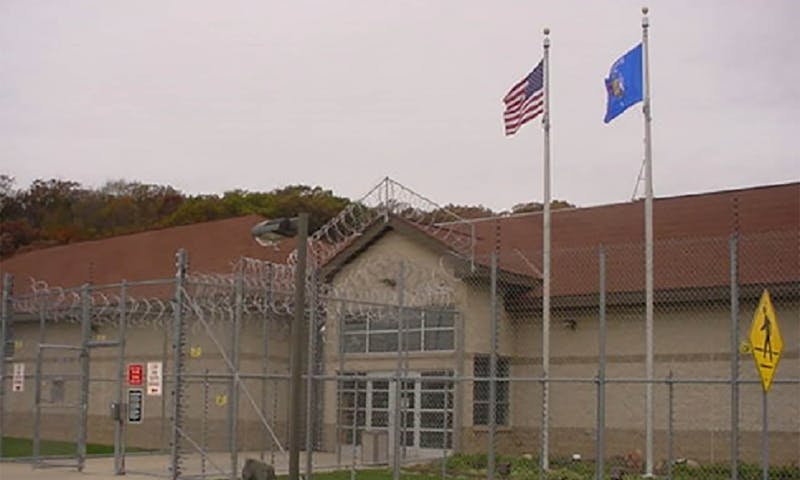
“I’m offering you what the Rockefellers’ get — and that’s because you deserve it just as much,” said UW-Odyssey Project co-Founder Jean Feraca.
Image By: Courtesy of the State of Wisconsin Department of Corrections
“I’m offering you what the Rockefellers’ get — and that’s because you deserve it just as much,” said UW-Odyssey Project co-Founder Jean Feraca.
Image By: Courtesy of the State of Wisconsin Department of Corrections“I was born into cycles of violence, alcoholism and drugs, and it wasn’t until I came to prison that I learned how to read and write,” a student in the Odyssey Project testified. “I fell in love with the worlds that words built.”
Founded in 2003, the UW Odyssey Project offers UW-Madison humanities classes for adult students facing economic barriers to college, such as single parenthood, homelessness, drug and alcohol addiction, incarceration, depression and domestic abuse, according to their website.
In fall 2019 the program launched Odyssey Beyond Bars — the first initiative in the state to facilitate credit courses face-to-face with people who are incarcerated.
The program builds on the noncredit enrichment courses that Odyssey and the Oakhill Prison Humanities Project have offered for several years at the Oakhill Correctional Institution.
Every Thursday evening, 15 men gather in a classroom to read and write essays for an English 100 class taught by Assistant Professor Kevin Mullen.
“I taught for a long time and what really struck me with these students is just how dedicated they were to really get the most out of the class that they possibly could,” Mullen said. “They put in so much time and effort into the assignments that I was just really impressed by how dedicated they were to it and how inspired and enthusiastic they were to do the work itself.”
All 15 men in the program graduated with three UW-Madison credits in English. Given this success, Odyssey has plans to increase the number of courses offered to students in prison, adding a multicultural American literature class this summer and a philosophy class next fall.
“I’m offering you what the Rockefellers’ get — and that’s because you deserve it just as much,” said UW-Odyssey Project co-Founder Jean Feraca.
The late Earl Shorris established the framework for UW Odyssey in New York City, where he introduced impoverished adults to philosophical theories such as Plato, inspiring co-Founders Jean Feraca and Emily Auerbach to bring a similar program to the university.
The Odyssey program built on Shorris’ work, adding crucial components to the adult education program. Odyssey Junior, one such component, is not just daycare — it’s an intentional space where children can begin their educational journey right alongside their parents.
“‘We train poor people, we do not educate them,’ Earl used to say,” Feraca said. “The assumption is they are not worthy of education. That sense of worth is built systematically throughout the year, so that by the end of the year it is more likely than not that an Odyssey graduate will have been transformed. It impacts them in extraordinary ways.”
The Odyssey Course is a six-credit English literature class where UW-Madison professors introduce adults to great works of literature, philosophy, history and art while helping them improve writing and critical thinking skills.
Feraca credited Auerbach for the dedication required to keep a program like this alive, noting her extreme commitment to the continuing success of the students.
“When somebody fell through the cracks and ended up in prison, she actually brought his homework to him,” Feraca said. “If people ended up in the hospital, she would go visit them. She was very dedicated. That’s why UW-Odyssey has sustained itself and is growing.”
Friends of Odyssey is an additional program dedicated to the continuing success of students who have graduated from the Odyssey Course.
“It’s for anyone that has made it through the program and wants to continue,” Feraca said. “We help them find the means to do that so it doesn’t stop. This is a college prep course really that were teaching.”
Mullen noted it’s a powerful thing for the men taking a class at UW-Madison, as it gives them a sense of confidence and purpose while they are incarcerated.
“There was a really strong sense of community that formed in the classroom itself, where I think they were able to really create a strong group dynamic because they’re all in this college class together and they seem to really have bonded well, which I think is a great outcome,” Mullen said.
The program is so successful UW-Odyssey hopes to expand the curriculum and eventually have a full degree-granting program at multiple prisons across the state.
“For the guys in prison, what it means to them to see themselves able to tackle Plato's philosophy among other things and very classic literature, they get this hunger for the stuff, they love it, they latch onto it and they chew it and they want more,” Feraca said. “It's food for the soul.”